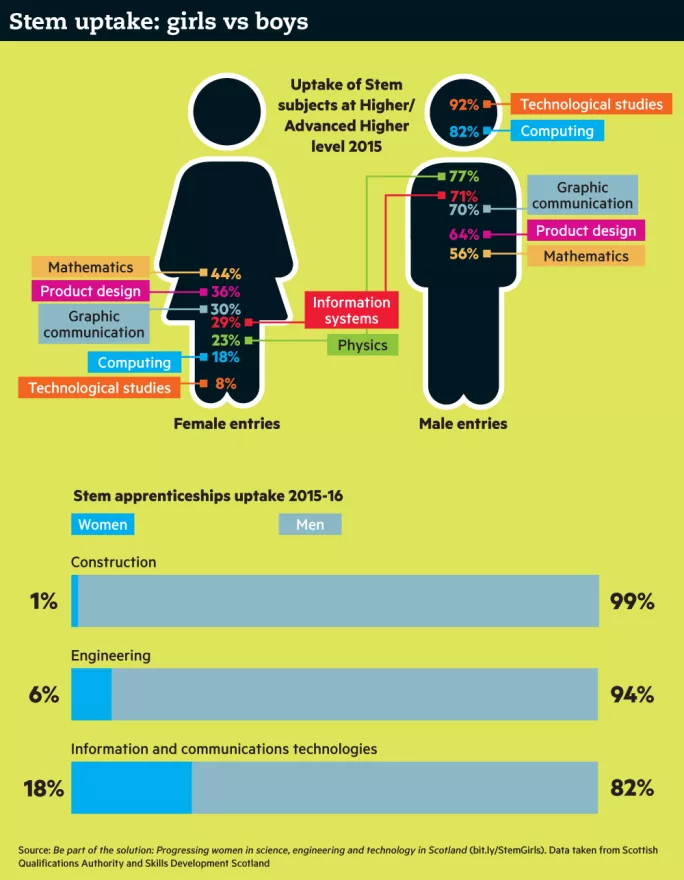How do we get girls to take up science? Ban the boys

Girls-only science sessions should be introduced in schools in a bid to encourage more women into Stem careers, an influential campaign group has said.
Equate Scotland said that this would help girls to overcome the lack of confidence they show in mixed-gender classes and go a long way to bringing more women into the sector.
While the idea was welcomed by some, others challenged the idea of girls being singled out in this way.
Equate’s director, Talat Yaqoob, made the call at education and technology event EduTech 2016, adding that there was “a lot of controversy” over whether you have single-sex education.
But Ms Yaqoob said that the idea was bolstered by research. “Girls are less likely to put their hands up, to feel confident in a [mixed] class,” she said. “So there’s a lot of evidence that says we should have same-sex classes”.
Avoiding ‘special treatment’
When Equate Scotland asked young people in a survey - mostly female - to choose up to three ways of improving participation in Stem, only 23 per cent opted for “girls’ science clubs or girl-only science lessons”. But the idea was far more popular among those still at school - nearly half supported it.
Ms Yaqoob, whose preferred model is girl-only sessions at lunchtime or after school, in addition to mixed classes, said misconceptions around the idea probably prevented a higher level of support. Girls were wary of being seen to get “special treatment”, she said.
“There’s a lot of myth-busting involved in why we’d have girl-only sessions…It’s not about special treatment, it’s about equal footing,” she said.
‘There’s a lot of myth-busting involved in why we would have girl-only sessions’
The survey responses were part of an Equate Scotland report - Rising to the Challenge: how Scotland can recruit, retain and support women in Stem - backed by first minister Nicola Sturgeon. It stated that many schools or extracurricular clubs, such as GirlCode, already had single-sex environments.
The report also cited 2012 Institute of Physics research showing a higher percentage of girls taking physics in girl-only schools, but Equate Scotland stressed that the impact of single-sex education was disputed by researchers.
Delegates at EduTech gave a mixed response to the single-sex science idea. One teacher said that work had to start earlier as “girls are blocking out Stem careers as early as S2”.
Another speaker, Dr Laurie Butgereit of Nelson Mandela Metropolitan University in South Africa, said that parents needed “gender education”, as they were “buying Barbie dolls and not Meccano sets for their little girls”.
Ali King, a data engineer at one of Scotland’s only two start-ups with a value of more than a billion dollars, said that more female role models were needed. Ms King, who works for online fantasy sports business FanDuel, said she had few role models while growing up and only entered her sector by chance later in life. “I thought you had to be a geeky boy who’d been programming since the age of 3,” she said.
Boxing clever
Patrick McGrory, faculty head of technologies at Glasgow’s Shawlands Academy, told TESS that his department had worked hard to iron out subtle and unconscious gender bias.
S2s, for example, did a “craft-box project”, with what in the past would have been called a “jewellery box”. “We thought we really should be getting pupils to decide what they want to store in it,” said Mr McGrory.
Last year, University of Glasgow psychologist Dr Gijsbert Stoet told TESS that the only way to get more girls into science would be to force them to take it (“Make science compulsory in secondary schools”, 25 September, 2015). He said that differences between boys’ and girls’ career ambitions had remained stable over time, and seemed even stronger in richer and more gender-equal countries.
Dr Stoet also found little evidence that common solutions, such as more female role models, would make much difference.

You need a Tes subscription to read this article
Subscribe now to read this article and get other subscriber-only content:
- Unlimited access to all Tes magazine content
- Exclusive subscriber-only stories
- Award-winning email newsletters
Already a subscriber? Log in
You need a subscription to read this article
Subscribe now to read this article and get other subscriber-only content, including:
- Unlimited access to all Tes magazine content
- Exclusive subscriber-only stories
- Award-winning email newsletters